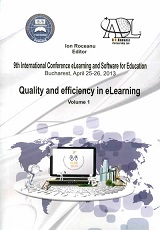CULTURAL CHALLENGES POSED BY E-LEARNING IN AN ETHNICALLY DIVERSE ACADEMIC ENVIRONMENT
CULTURAL CHALLENGES POSED BY E-LEARNING IN AN ETHNICALLY DIVERSE ACADEMIC ENVIRONMENT
Author(s): Virginia Mihaela DumitrescuSubject(s): Education
Published by: Carol I National Defence University Publishing House
Keywords: Learning Styles; Computer-Assisted Education; Cultural Differences; Effectiveness I. EDUCATION IN A MULTICULTURAL ENVIRONMENT So far there has been little consensus on the exact definition of “e-learning” (a word sometimes used interchangeably with a mu
Summary/Abstract: The paper is based on the author’s experience of teaching an Intercultural Business Communication course and seminar to ethnically and culturally diverse groups of graduate students of the Bucharest Academy of Economic Studies. It looks at students’ culture-specific attitudes and responses to a variety of teaching, learning, and research methods including, apart from the traditional ones (i.e., classroom interaction with the course and seminar instructor or the use of paperprinted material), a wide range of computer-assisted options (loosely designated as e-learning) such as the use of resources and information available on the programme’s website, additional selfstudy/research material sent by email or available on the Internet, as well as email-administered tests/exercises. Cultural differences in learning styles are explained in terms of various cultures’ distinct communication preferences, their specific treatment of and attitude towards time, authority, uncertainty, and group orientation vs. individual achievement. The theoretical framework of this paper consists in Geert Hofstede’s and Fons Trompenaars’s models of intercultural analysis, Adina Luca’s research on the Romanian culture, and the author’s own views on cultural differences and their impact on students’ learning styles and habits. The paper aims to demonstrate that, despite the growing popularity of technology-mediated education in our increasingly “flat”, borderless world, the effectiveness of e-learning (even in the broadest sense of the word) in relation to the more traditional training options should always be considered within the context of culture.
Journal: Conference proceedings of »eLearning and Software for Education« (eLSE)
- Issue Year: 9/2013
- Issue No: 01
- Page Range: 579-584
- Page Count: 6
- Language: English

